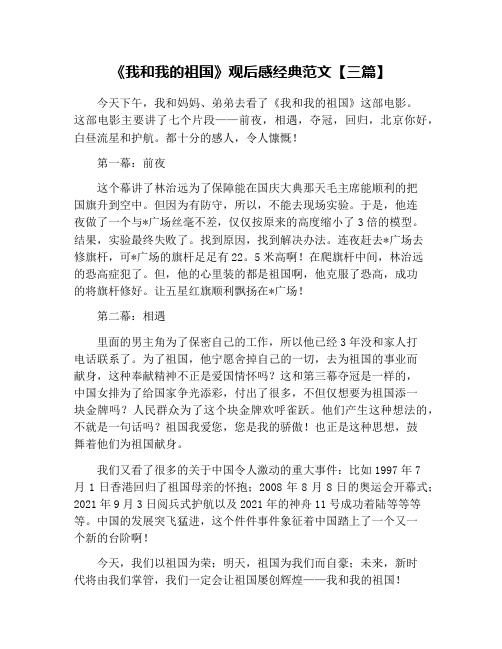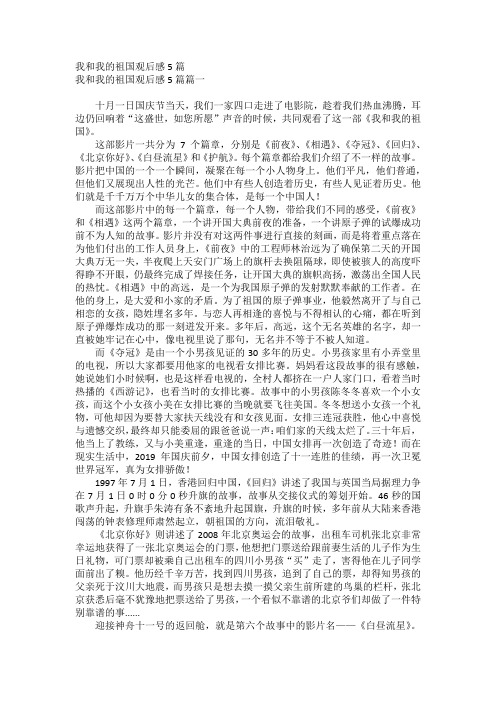我和我的祖国经典电影观后感【三篇】
- 格式:doc
- 大小:28.00 KB
- 文档页数:7

《我和我的祖国》观后感《我和我的祖国》观后感(精选15篇)当认真看完一部影视作品后,一定对生活有了新的感悟和看法吧,为此就要认真思考观后感如何写了。
那么观后感到底应该怎么写呢?以下是店铺为大家整理的《我和我的祖国》观后感,仅供参考,大家一起来看看吧。
《我和我的祖国》观后感篇1我怀着无比激动的心情看完了电影《我和我的祖国》。
在观影过程中,我曾数次落泪。
在电影的七个故事中,最让我感动的是《前夜》和《相遇》。
《前夜》这个故事给我们讲述了的开国大典前一个鲜为人知的故事。
其中的一个情节给我的感触特别深:为了让国旗升到旗杆顶端稳定下来,旗杆顶部必须装一个固定的金属球。
但是,在演练升旗的时候,由于这个铁球的强度不够,受到旗帜的冲击后就断裂了。
为了能确保在即将到来的开国大典时,能让五星红旗顺利升上旗杆,必须将铁球内加入适当的镍和铬,让铁变成钢。
可是,当时的新中国刚刚结束了战乱,百废待兴,哪里去找镍和铬这种有色金属呢?最后是再一次发动人民群众,动员大家捐出含有镍和铬的东西。
一听是为了开国大典的升旗仪式,大家的热情都很高,积极地参与捐赠,但都不是炼钢所需要的镍和铬。
最后是清华大学化学系的教授捐出了实验室最后一块铬的样品,最终制出了升旗所需的钢球。
看到这里,我感触很多。
有谁能想到70年前的今天,我们的国家是这样积贫积弱,物质匮乏呢?今天的中国,冶金、制造,石油,化工等各种工业门类齐全,产量丰富。
放眼全球,没有哪一个国家,哪一个政党能在短短的70年中,让一个这么大的国家取得今天这样举世瞩目的成绩。
我真为祖国自豪!我是中航工业的航二代子弟,我的爸妈是国家小三线建设中的一员。
这里我给大家简单介绍一下中国的三线建设。
“三线建设”是中共中央和毛泽东主席于20世纪60年代中期作出的一项重大战略决策,它是在当时国际局势日趋紧张的情况下,为加强战备,逐步改变我国生产力布局的一次由东向西转移的战略大调整,建设的重点在西南、西北。
我们x省x市的x钢厂也是三线企业。

2019热门电影《我和我的祖国》观后感精选10篇_《我和我的祖国》经典观后有感范文《我和我的祖国》是由陈凯歌、张一白、管虎、薛晓路、徐峥、宁浩、文牧野联合执导,黄渤、张译、吴京、马伊琍、杜江、葛优、刘昊然、陈飞宇、宋佳领衔主演,演绎7组普通人与祖国大事件息息相关的经历,以小人物见证大时代,献礼新中国成立70周年献礼片。
下面是小编为大家收集的关于2019热门电影《我和我的祖国》观后感精选10篇_《我和我的祖国》经典观后有感范文。
希望可以帮助大家。
篇一:《我和我的祖国》观后感作者:李向妮《我和我的祖国》9月30日全国公映!当听到这个消息的时候,我充满期待!10月6日休假的第一天,我便早早与同事约好,一起带着孩子前去观看了充满期待的大片《我和我的祖国》。
通过观影,我了解到这部电影是由七位导演分别取材新中国成立70周年以来,祖国经历的无数个历史性经典瞬间。
电影分别由《前夜》、《相遇》、《夺冠》等七个单元步骤构成。
给我印象最深的要数回归这个单元了,中国人为什么这么爱国?这个问题的答案,不就在问题里吗?任凭沧海桑田有一刻永恒不变,《我和我的祖国》一刻也不能分割。
1997年7月1日香港回归祖国的怀抱,当国旗升起的那一刻,让海风吹拂了几千年,每一滴泪珠仿佛都说出你的尊严,让海潮伴我来保佑你,请别忘记我永远不变黄色的脸。
伴随着《东方之珠》,眼泪一下子就涌出来了。
这一切的场景,我犹如穿越了一般,一秒都不能让的底线,零分零秒必须升起国旗,一切仿佛历史的重演。
回顾了新中国成立70周年以来,祖国的经典历史,感动之心久久不能平复。
心怀感恩的心,爱国的赤诚,我会珍惜眼前这来之不易的幸福生活,会时刻牢记先烈们用鲜血捍卫的祖国版图。
我们每一位中国人都是擎旗手、护旗手。
我为我自己是一名中国人,一名中国公民而感到骄傲和自豪。
篇二:《我和我的祖国》观后感这些天我看来很多关于新中国成立的视频和文章,尤其是《我和我的祖国》这部电影对我的触动很深。

我和我的祖国电影观后感三年级学生全文共3篇示例,供读者参考我和我的祖国电影观后感三年级学生篇1今天和同学集体看了电影《我和我的祖国》,观看时内心汹涌澎湃,久久不能平静。
这部电影由七个故事构成,分别是《前夜》《相遇》《夺冠》《回归》《北京你好》《白昼流星》《护航》,每个故事里的人都很平凡,他们并不是被万千人所铭记的伟人,但他们都是国家的成员,都是国家辉煌的缔造者和守护者。
整部电影的开始,讲述的是电动旗杆的设计和改良,发生在开国大典的前夜,这个故事并没有发生什么惊天地泣鬼神的战争,没有舍生取火的英雄,有关只是一群普通的群众,但它却让我感动不已。
因为当国家需要时,无数的平民百姓为了国家愿意捐出自己的心爱之物。
国家需要时,他们便一呼百应,要为国家做贡献。
为了保护国家的尊严,旗杆设计师林治远反复实验,一个月都没回家,为了更换更结实的阻停器,它克服重重困难,克服心里上的障碍,不为功名,不为利实禄,只为国家的荣辱,只为确保“万无一失”。
我未曾经历过开国大典,没经历过长难万险的解放战争,但当我看到林治远,看到守护广场的解放军,看到为了国家愿意付出一切的民众,我懂得开国大典有多不容易,懂得了为什么开国大典时有那么多人热泪盈眶,有那么多人振臂高呼。
因为这是民族的解放,是中华民族从此站起来。
因为为了它有无数人的付出生命,因为为了它无数的民众团结一心,共同抗敌,因为它是无数中国人所期望的一个新的开始,它是中国人新的希望。
《我和我的祖国》毫无疑问是一部主旋律电影,它讲述的是中国故事,它讲述的是平凡造就的伟大,它在用一种很简单,很深情的方式告诉着人们为什么要爱国,什么是爱国精神,讲述着中国一路走来的故事,讲述着一个道理:平凡造就伟大,每个人都可以做贡献者,成就者,个人的力量可能撑不起一片天,但群团结一心的人一定可以。
我和我的祖国电影观后感三年级学生篇2今天下午,我们一家和大舅一家一起去大地影院看电影——《我和我的祖国》。
故事主要讲述了新中国成立70年来七个第一的历史瞬间,分别是:《前夜》《相遇》《夺冠》《回归》《北京你好》《护航》和《白昼流星》。

《我和我的祖国》观后感经典范文【三篇】今天下午,我和妈妈、弟弟去看了《我和我的祖国》这部电影。
这部电影主要讲了七个片段——前夜,相遇,夺冠,回归,北京你好,白昼流星和护航。
都十分的感人,令人慷慨!第一幕:前夜这个幕讲了林治远为了保障能在国庆大典那天毛主席能顺利的把国旗升到空中。
但因为有防守,所以,不能去现场实验。
于是,他连夜做了一个与*广场丝毫不差,仅仅按原来的高度缩小了3倍的模型。
结果,实验最终失败了。
找到原因,找到解决办法。
连夜赶去*广场去修旗杆,可*广场的旗杆足足有22。
5米高啊!在爬旗杆中间,林治远的恐高症犯了。
但,他的心里装的都是祖国啊,他克服了恐高,成功的将旗杆修好。
让五星红旗顺利飘扬在*广场!第二幕:相遇里面的男主角为了保密自己的工作,所以他已经3年没和家人打电话联系了。
为了祖国,他宁愿舍掉自己的一切,去为祖国的事业而献身,这种奉献精神不正是爱国情怀吗?这和第三幕夺冠是一样的,中国女排为了给国家争光添彩,付出了很多,不但仅想要为祖国添一块金牌吗?人民群众为了这个块金牌欢呼雀跃。
他们产生这种想法的,不就是一句话吗?祖国我爱您,您是我的骄傲!也正是这种思想,鼓舞着他们为祖国献身。
我们又看了很多的关于中国令人激动的重大事件:比如1997年7月1日香港回归了祖国母亲的怀抱;2008年8月8日的奥运会开幕式;2021年9月3日阅兵式护航以及2021年的神舟11号成功着陆等等等等。
中国的发展突飞猛进,这个件件事件象征着中国踏上了一个又一个新的台阶啊!今天,我们以祖国为荣;明天,祖国为我们而自豪;未来,新时代将由我们掌管,我们一定会让祖国屡创辉煌——我和我的祖国!【篇二】“我和我的祖国,一刻也不能分割,无论我走到哪里,都流出一首赞歌。
”在中华人民共和国成立70周年之际,回忆过去,展望未来,相信大家都有千言万语想对祖国诉说,或是感恩,亦或是一些简单的话语,都足以表达出我们对祖国的敬意。
定档2019年9月30日上映的电影《我和我的祖国》,由总导演陈凯歌、总制片人黄建新,导演陈凯歌、张一白、管虎、薛晓路、徐峥、宁浩、文牧野共同倾力打造。

看我和我的祖国电影观后感8篇看我和我的祖国电影观后感篇1今天,我观看了《我和我的祖国》这部电影,令我感慨万分。
这部电影主要讲了七个小故事:开国大典的前夜;我国第一颗原子弹研发成功背后的一名科研人员与他女朋友的一次相遇;中国女排首次在奥运会上夺冠;1997年香港回归;2008年奥运会在北京举行;神舟十一号飞船返回舱成功着陆;庆祝抗日战争胜利70周年阅兵式的护航。
别看这七个小故事中的主人公,个个都是小人物,可他们都是为祖国做出了贡献,实现了自己的价值,成了一个对国家、对人民、对自己有用的人。
其中,我印象最深刻的还是《相遇》这个故事。
这个故事主要讲了为研制中国第一颗原子弹,一名普普通通的科研人员,在一次实验事故中,不惜受到核辐射,关掉了机器,自己却得了重病。
后来在车上他相遇了他的女友,可他为了保守国家的机密,为了不让女友为自己的病情担心,他假装不认识她,可在女友努力的劝说下,他们刚要相认时,可是命运却用了一道人流将他们这对恋人又一次无情地分开了。
这个故事最令我感动的是这位科研人员受伤后,基地领导问其他人:“他叫什么?”,可是却没有人知道他的姓名。
一个拯救了所有在场的科研人员却身负重伤的人,却没人知道他是谁,他也不想让人知道他的名字。
这是一种多么伟大而又平凡的力量啊!可以舍已为人,可以为别人出生入死,却在默默无闻地辛勤工作着,为新中国的事业奉献自己宝贵的生命。
还有在那个马路上,来来往往兴奋的人,又一次隔开了他和她,这是一种何等的痛啊!你所深爱的人就在你的面前,可她却又离你遥不可及,你却什么也做不了,只能望着她的背影离你越来越远,相遇却又变成了永远的分离。
我和我的祖国,一刻也不能分割,无论我走到哪里,都流出一道赞歌……祖国啊,无论前方多么坎坷,我们中华儿女一定会和你在一起!看我和我的祖国电影观后感篇210月1日下午舅舅带着我和姐姐弟弟去郑州电影院看我和我的祖国,我怀着无比激动的心情,观看了这部电影。
这部电影观看后是我感受最深刻的是白昼流星的故事:一场无情的洪水淹没了,淹没了。

我和我的祖国观后感5篇我和我的祖国观后感5篇篇一十月一日国庆节当天,我们一家四口走进了电影院,趁着我们热血沸腾,耳边仍回响着“这盛世,如您所愿”声音的时候,共同观看了这一部《我和我的祖国》。
这部影片一共分为7个篇章,分别是《前夜》、《相遇》、《夺冠》、《回归》、《北京你好》、《白昼流星》和《护航》。
每个篇章都给我们介绍了不一样的故事。
影片把中国的一个一个瞬间,凝聚在每一个小人物身上。
他们平凡,他们普通,但他们又展现出人性的光芒。
他们中有些人创造着历史,有些人见证着历史。
他们就是千千万万个中华儿女的集合体,是每一个中国人!而这部影片中的每一个篇章,每一个人物,带给我们不同的感受,《前夜》和《相遇》这两个篇章,一个讲开国大典前夜的准备,一个讲原子弹的试爆成功前不为人知的故事。
影片并没有对这两件事进行直接的刻画,而是将着重点落在为他们付出的工作人员身上,《前夜》中的工程师林治远为了确保第二天的开国大典万无一失,半夜爬上天安门广场上的旗杆去换阻隔球,即使被骇人的高度吓得睁不开眼,仍最终完成了焊接任务,让开国大典的旗帜高扬,激荡出全国人民的热忱。
《相遇》中的高远,是一个为我国原子弹的发射默默奉献的工作者。
在他的身上,是大爱和小家的矛盾。
为了祖国的原子弹事业,他毅然离开了与自己相恋的女孩,隐姓埋名多年。
与恋人再相逢的喜悦与不得相认的心痛,都在听到原子弹爆炸成功的那一刻迸发开来。
多年后,高远,这个无名英雄的名字,却一直被她牢记在心中,像电视里说了那句,无名并不等于不被人知道。
而《夺冠》是由一个小男孩见证的30多年的历史。
小男孩家里有小弄堂里的电视,所以大家都要用他家的电视看女排比赛。
妈妈看这段故事的很有感触,她说她们小时候啊,也是这样看电视的,全村人都挤在一户人家门口,看着当时热播的《西游记》,也看当时的女排比赛。
故事中的小男孩陈冬冬喜欢一个小女孩,而这个小女孩小美在女排比赛的当晚就要飞往美国。
冬冬想送小女孩一个礼物,可他却因为要替大家扶天线没有和女孩见面。
2019《我和我的祖国》电影观后感《我和我的祖国》电影影评集锦我的祖国,高山巍峨,雄伟的山峰俯瞰历史的风狂雨落,暮色苍茫,任凭风云掠过。
坚实的脊背顶住了亿万年的沧桑从容不迫。
下面小编为大家推荐《我和我的祖国》电影观后感,希望能帮助你们!《我和我的祖国》电影观后感(一)金色的十月,硕果累累,20xx年的十月,我们唱着红歌迎来了新中国xx岁的生日,全国上下亿万各族人民歌舞欢腾,气势磅礴的xx周年国庆阅兵仪式,让我深深感受到祖国的繁荣昌盛,安定和谐。
当我唱着《我和我的祖国》这首歌曲的时候,就会有一股暖流在心里流动。
我深深地爱着祖国,就像爱自己的妈妈一样。
当我去领略气势磅礴的兵马俑,攀登艰险秀丽的华山时,我的心中就会感到无比自豪,我的祖国到处是壮美的山川,源远流长的文化历史。
我为祖国的政治进步而自豪,今天是人民成为国家真正的主人,掌握着国家真正的命运,决定着民族的未来;我为祖国的经济发展而自豪,今天的祖国经济高速发展,综合国力大幅提升,人民生活不断改善。
而那些在课文里所记载小红军的艰苦生活,还有课文里小时候的陈毅将军,在炉火前看书情形,今天的我是无法想象和体会的。
因为祖国,我有了家,汶川的孩子才不会流离失所;因为祖国,我有了快乐,我可以自由地玩耍;因为祖国,我学到了知识,得到了收获,就像歌中唱到的那样:“我和我的祖国一刻也不能分割,无论我走到哪里,都流出一首赞歌……我的祖国和我,像海和浪花一朵,浪是海赤子,海是浪的依托……”祖国啊!祖国,愿你永远年轻,永远快乐!《我和我的祖国》电影观后感(二)在我的心里有着一个非常美丽的国度。
她虽然历经千年沧桑,却依然顽强屹立于世界强国之林,她用那不朽的传统文化将五十六个华夏民族紧密相连。
她——就是我的祖国。
从浩瀚的书籍里,我认识了祖国五千年的文化;从出土的陶瓷上,我把历史的回声聆听;从香浓的茶叶里,我被那文人的韵味所吸引;我开始悄悄把祖国装进我幼小的心里。
雨霏霏的江南,在淅淅沥沥的小雨中,漫步在青石板的老街上,体验着“雨打芭蕉、门环惹铜绿”的韵律。
我和我的祖国观后感我和我的祖国观后感(精选45篇) 细细品味⼀部作品以后,⼀定有不少感悟吧,记录下来很重要哦,⼀起来写⼀篇观后感吧。
观后感你想好怎么写了吗?以下是⼩编精⼼整理的我和我的祖国观后感,欢迎⼤家借鉴与参考,希望对⼤家有所帮助。
我和我的祖国观后感篇1 在中华⼈民共和国建国71周年之际,我看了由陈凯歌导演的《我和我的祖国》,其中我感触最深的是第⼀段——“前夜”。
前夜,是新⽣的开始。
可是在1949年的⼗⽉⼀⽇凌晨,我们看到的不是⾼台上的伟⼈,⽽是为了祖国第⼀⾯国旗顺利升起的⼀个个⼩⾓⾊。
71年前,科技并不发达,在开国⼤典前夜,电动升旗项⽬的负责⼈林治远正在模拟北京天安门升旗的情形,只见他按下电钮,五星红旗缓缓升起,⼀切是那么顺利。
当国旗到达最⾼点的时候,忽然只听到“砰”的⼀声,旗⼦伴着风的喘息掉在了地上,随之落下的还有林治远因为兴奋⽽⾼⾼抬起的⼼。
后来经过排查他们终于知道是阻断装置出了问题。
更换阻断装置急需三种极其稀有的⾦属材料,林治远⾮常的绝望,担⼼开国⼤典的升旗仪式上也会出现这个状况。
不过事情有了转机,原来是⼴⼤⼈民群众深夜听到了动员⼴播,积极将各⾃各家的⾦属器具以及⾸饰、收⾳机等贵重物品纷纷拿到了现场。
在离6点还有⼀个⼩时左右,林治远⼒挽狂澜,虽然恐⾼,但是也亲⾃爬⼭了旗杆,把装置焊在了旗杆顶上。
1949年10⽉1⽇下午3点,⽑主席宣布“同胞们,中华⼈民共和国中央⼈民政府今天成⽴了”主席旋转电动按钮,五星红旗冉冉升起…… 正值国庆期间,电影带给我的感触⽐以往更加深刻。
我们要像林治远⼀样为了国家利益能兢兢业业的做好每⼀件事,⼀个国家的崛起正需要每⼀个平凡的⼈努⼒付出。
《我和我的祖国》是⼀部史诗,更是⼀种信仰,国强则民强,国富则民富,国家昌盛则民族更昌盛,值此新中国成⽴七⼗⼀周年之际,祖国母亲,祝您⽣⽇快乐! 我和我的祖国观后感篇2 我和母亲⼀起去电影院看了《我和我的祖国》这部意义⾮凡的电影。
《我和我的祖国》观后感《我和我的祖国》观后感范文(精选33篇)看完某一作品后,相信大家增长不少见闻吧,为此就要认真思考观后感如何写了。
快来参考观后感是怎么写的吧,下面是小编整理的《我和我的祖国》观后感,仅供参考,欢迎大家阅读。
《我和我的祖国》观后感篇1国庆节期间,我去电影院看了《我和我的祖国》这部电影,我心里深受震动,几度热泪盈眶。
这部电影主要讲了七个故事,分别是“前夜”、“相遇”、“夺冠”、“回归”、“北京你好”、“白昼流星”和“护航”,我最喜欢“前夜”这个故事。
这个故事主要讲了开国大典前一夜的事情,工程师林治远为了保证在开国大典上升国旗的时候能万无一失,通宵达旦,反复实验了好多次。
后来需要镍和铬来做材料,乡亲们一听说是开国大典上要用的,都争先恐后的来送,看到大家那么热情,我深刻体验到了“爱国”这个词的含义。
当开国大典上毛主席按动按钮的时候,我心中不由自主的紧张起来,当国旗顺利的随国歌冉冉升起并安全停稳时,我长长的舒了一口气,放心下来。
我也喜欢“回归”这个故事,它讲的是香港回归祖国的故事,在回归之前的训练中要求升旗,一秒也不能差。
早了一秒是不遵守承诺,晚了一秒又是对不起祖国人民,看到大家都那么认真,我的钦佩之情油然而生。
我和我的祖国是赞美祖国的一部电影,讲述了小人物的大故事,每一次伟大事件的背后都有许多平凡的小人物做出了不凡的贡献和努力。
我作为一名少先队员,也要尽自己的一份力,让祖国变得更加繁荣,更加富强。
只有好好学习,刻苦读书,才能成为祖国的栋梁之才,为祖国发展做出应有的贡献。
《我和我的祖国》观后感篇2“我和我的祖国,一刻也不能分割……”《我和我的祖国》上映了。
导演是陈凯歌、徐峥等。
主要分七个阶段介绍了新中国的七件大事。
我最喜欢的是“前夜”这一段,讲述了林致远筹备着毛主席电动升旗的一个过程。
林致远是一个很精细的人,也是一个对工作极其认真的人。
其中有一段我记忆颇深,各家各户提着一只只大灯笼,搜尽了家中的物事,也要让开国大典顺利进行。
电影《我和我的祖国》观后感800字例文3篇【导语】由观而引出感,这开头部分就好比一条醒目的标语或引子一样,先交待清楚看了什么影片,有什么感想。
一般来说,观后感要求简明扼要、开门见山,千万不要绕圈子、卖关子、遮遮掩掩,而是要用肯定的语气概括地说出感受。
以下是本站为大家精心整理了电影《我和我的祖国》观后感800字例文3篇,供大家的品读。
电影《我和我的祖国》观后感800字【1】亲爱的祖国,当第一抹霞光染到你身上时,我的世界便亮了。
你屹立于这神奇的土地五千年,阅尽无数繁华苍凉,哪怕时间变迁,五千年的流逝,那传承在历史间的“以国家兴荣为己任”的民族魂却从未流散。
时间展开一卷画面流光溢彩。
首先,看到的是被朝霞浸染的书舍。
笑容如花的老者,一脸慈爱,手持竹筒,对三千弟子说:“士不可以不弥毅,任重而道远,仁以为己任,不亦重乎死而后已,不亦远乎”摇头晃脑之间那拖长的字仿佛一首歌融入风里被传播到更远的地方;然后画面被瞬时拉长模糊的线带,最后重归于清晰。
那是屹立于江边的屈子,他轻捋长须,对着滚滚东流的汨罗水长吟“路漫漫其修远兮,吾将上下而求索”。
他明白他只是一个不被重用的人,但就算这样他依旧思索,因为他明白国家兴亡匹夫有责这个道理;接着画面的色彩开始离散,散开又渐渐地显现出江水模样。
那是一条怒吼的江,江中有条摇摆不定的船,船上有一个声音大喊:“人生自古谁无死,留取丹心照汗青。
”虽不见人,但我明白他把命已看得很轻很轻……然后的画面,只显现出淡淡的水彩。
我只能听见平仄韵律优美的诗歌。
押韵的长短诗,还有一清冽灵动的声音唱:“生当作人杰,死亦为鬼雄。
至今思项羽,不肯过江东。
”那声音仿佛被风吹散,只有点点余音,依旧绕梁。
那淡淡的水彩,逐渐变稠。
那是一个人头攒动的菜市口,画面定格的时候我看到的是他颈间涌出的热血,以及那句未消散的话:“我自横刀向天笑,去留肝胆两昆仑。
”我们都知道那是谁,也记得他曾说过“作为中国变法流血的第一人”。
他爱他的祖国,他希望她繁荣,他也希望她不再迷茫,于是他献出了他的命,他死前还在笑,可是笑里绽放了那么多的难过。
我和我的祖国经典电影观后感【三篇】
【篇一】
我们的祖国古老而伟大,我们的祖国壮丽而永生!祖国,
我在圆明园认识了你的屈辱,你的悲愤,我在八达岭认识了
你的磅礴,你的巍峨,我在大漠草原认识了的宽广,你的辽
阔,我在驿道古渡认识了你的悠久,你的坎坷。
历史的车轮将祖国载入了新的纪元----祖国不再只有
原始的火药,腾空的飞船将中华儿女的飞天梦想载上寰宇;
祖国不再只有万里长城,“高峡平湖”的三峡水库令世界瞩
目;祖国不再贫穷落后,中华民族已实现温饱,迈向小康,
屹立于世界民族之林。这一切,早已融入我心中挚爱的情节,
早已铭刻我永恒的信念。
我爱我的祖国,你傲然屹立于世界东方,不论身边风云
如何变化,始终延着真理的方向永往直前。我灵魂的纤绳将
永系你风帆的桅杆;我手中的画卷将永远书写你与时俱进的
风采。
我爱我的祖国,源于我对祖国的忠诚和热爱。每当五星
红旗在蓝天漂荡,每当国歌在天空中回荡,民族自尊的血液
就会在亿万个炎黄子孙的血液中沸腾,振兴中华的号角就会
在亿万个中华儿女的耳边震撼。随着“中国人民从此站起来”
的一声东方巨人的呐喊,中华儿女用自己的灵魂之火温暖了
祖国一度冰冷的身躯,用自己的热血点燃了曾经暗淡的希望
之火,用自己饱满的激情构筑了中国特色社会主义的宏图大
业。
我爱我的祖国,是因为我的祖国迈过了千秋坎坷,洗净
了百年耻辱,用百折不挠的毅力挺起了钢铁般的脊梁。这个
东方巨人正带着民族的希望,带着与时俱进的信念,稳步的
走向世界,坚定的走向未来!中华民族进入了一个飞速发展,
日渐强盛的崭新时代!
我爱我的祖国,语言无法表述我对你的情怀,激情无法
回报你的挚爱,诗歌无法书写对你的赞美。我要适应时代的
需要,正确认识祖国的历史和现实。把爱国的情感和兴国的
责任,融化在血液中,把爱国的志向和报国的实践,落实在
行动上。
我爱我的祖国,是因为我的信念是坚定的,我们的奋斗
是坚实的,我们的誓言是坚决的。为了明天,我们将用毕生
的精力,我们将用豪迈的激情,冲向胜利与理想的彼岸。
国家兴衰,匹夫有责。我们没有理由推卸历史的责任。
回首昨天,我们的祖国在曲折中走过了光辉的历程,展望未
来,我们的祖国正以让世人瞩目的姿态跻身于世界民族之
林。而今天,我们每一个中华儿女更应为“中华崛起”而拼
搏,用实际行动践行“中华民族之伟大复兴”。
振兴中华,建设有中国特色社会主义,是前无古人的拼
博奋斗。我们要把握今天,憧憬明天,发奋图强,报效祖国,
用我们的热血谱写出前不负古人,后无愧千秋万代的历史新
篇章。特别是这三十年来,祖国的变化是翻天覆地的,综合
国力不断增强,进一步缩小了与发达国家的差距;五星红旗
一次次飘扬在世界各地,一次次震撼奥运赛场,一次次到达
南极、北极,直至宇宙太空,在世界金融危机中,祖国以“中
国速度”、“中国经济”昂首挺胸,显示了勃勃生机和活力,
在汶川地震,玉树地震、舟曲特大泥石流等特大自然灾害中,
经过艰苦卓绝的努力,中华民族依然用自己的脊梁挺起了祖
国古老长城,在世界对发展问题哀叹时,上海世博会展示了
祖国与时俱进的伟大成就和坚定的理想信念。龙的传人再一
次向世界昭示,我们伟大的祖国正在不断走向强大!正是这
种不屈不挠的民族精神,激励了我们灵魂的自豪,使我们更
加自信、自尊、自强。
吴玉章说“能够勇于献身于自己祖国的事业,为实现理
想而斗争,这是最光荣不过的事情”我们要立足岗位,尽职
尽责,把自身的工作与建设有中国特色社会主义的伟大事业
结合起来。我们要坚定信念,奉献社会,把有限的生命投入
到无限的为祖国的强大而努力奋斗的工作之中,我们要敬业
爱岗,崇尚理想,把爱岗位,爱事业、爱人民、爱党和爱祖
国融为一体,践行我们的诺言,践行我们的信念,在平凡的
岗位上,做出不平凡的贡献,以对祖国的真诚,追求国富民
强。
新世纪的曙光已经浴满祖国大地,人类文明跨入一个崭
新时代,我们都是炎黄子孙,我们都是龙的传人,中华民族
五千年的文明要继承下去,这就需要我们以最灿烂的文章填
充祖国宏伟壮丽的篇章,让我们在畅想祖国辉煌的今天,用
我们为之不懈的奋斗,让东方巨龙腾飞在世界之巅。
【篇二】
小时候,妈妈曾指着地球仪对我说:“在世界的东方,
有一个神奇而美丽、古老而年轻的国家,名叫中国。我们就
是中国人。”
我的祖国伴我成长。上学了,我光荣地成为了一名少先
队员,戴上了鲜艳的红领巾,这是多么的自豪!长大了,我
知道我们的祖国是一个有五千年历史的文明古国。造纸、印
刷术、火药、指南针四大发明对世界文明做出了巨大贡献。
她还是个礼仪之帮。我在幼儿园时,已学会背诵《三字经》。
上了小学,会背诵《弟子规》和《论语》。“学而时习之不亦
乐乎”,每个新中国的孩子都在快乐地学习和成长。
今天,我们的祖国70华诞,举国上下普天同庆。我弹
奏一曲《龙的传人》,大声唱起《歌唱祖国》。早上,我们全
家人都目不转睛地收看“阅兵仪式”,我还用相机录下了这
激动人心的时刻。晚上,我和同学兴奋地来到琶洲看国庆烟
花汇演。珠江的夜空,已被渲染得五彩缤纷,火树银花的烟
火照耀着欢呼的人群,每个人的脸庞都绽开了幸福的笑容。
没有*,就没有新中国。祖国给我们带来了无比幸福的生活。
在我家的车房,有我外公的一辆60年代的凤凰牌自行
车,那可是他的宝贝。后来,爸爸买了摩托车。现在,又买
了一部小轿车。听爸爸说,他小时候电风扇和电视机是很少
有的。而现在,许许多多的家庭不单有了电视机、冰箱、洗
衣机,还有了空调机。人们的生活真是一天比一天过得好了。
不仅咱们农村有了翻天覆地的变化,城市也一年比一年变得
现代而美丽。我家原住黄石路,我出生那时还是偏远郊区,
现在已是白云新城,车水马龙,旺得很了......
当今,嫦娥赶月,神七飞天,我们的祖国令全世界刮目
相看。祖国是我们的母亲,我爱我的祖国!
【篇三】
时光记载着久远,历史印证了变迁,我们伟大的祖国,
正在飞速地向前发展。日新月异改变着祖国的面貌,突飞猛
进是”历害了我的国”的真实体现。
科技,国防,都取得了辉煌成果,我们己经走到了世界的
前面!”人造卫星”环绕着宇宙,”胶龙一号”完成了深水
测验,”天眼”瞭望,寻视着太空,”可燃冰”的开采,把
深海地下热能点燃。深海大桥画出了一条条彩虹,”天堑变
通途”,展现出了更多的美景奇观。灵巧的机器人,发挥出
智慧的才能,无人驾驶的飞机,也遨翔在无垠的蓝天。如此
众多的成就,我感到骄傲和自豪,我更要为伟大的祖国高歌
点赞!
山乡巨变,昔日偏僻的小山村,如今也有了很大的转变,
再也见不到低矮的茅草屋,路也变得宽敞平坦。湾湾的小河
边上砌好了护坡石,河畔路边也都加上围墙拦杆。琉璃瓦的
房屋错落有序,明亮的路灯也换成了太阳能光复板。村屯卫
生大有改善,清除垃圾,防治汚染,太阳能热水器入住农家,
卫生间也都像城里一样安上了坐便。社会主义的新农村,一
切都向现代化迈进,小康的路上大步向前!
农民从原始的刀耕火种,延续到如今的灯火炊烟,祖祖
辈辈的劳动人民,都是面朝黄土背朝天。滚一身泥巴淌一身
血汗。为了一年的收成,每天都是起早贪晚。年年都是耕田
的老手,却只能挣扎在温饱的边缘。如今的新型农民,真正
地挺起了腰杆,学的是新型农业,搞的是科学种田。掌握了
新的农业技术,丢掉了旧的传统观念。不用了种地的木犁,
抛弃了铲地的锄板,种地收割都是机械化,再也不用苦干实
干。领悟了科学道理,思想意思超前,先进的技术促进了农
业现代化,辛勤耕耘创建了新的家园。只因为有了绿水青山,
才能有致富的金山银山!